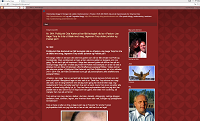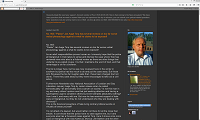|
Ecumenism, Biblical Unitarianism and Trinitarian Renewal
In this chapter, we will be looking at three great trends in the current Christian scene. First, we will consider the “ecumenical movement” that has been steadily gaining ground since its inception in the first part of the 20th Century, and which is reaching a fever pitch among Roman Catholics and Protestants. We will look at a few of the problems we see in this movement, and identify the central place Trinitarian orthodoxy occupies in it. We will then propose a biblical “bottom line” around which Christians can truly unite. We will then discuss a movement away from Trinitarianism among some scholars, as well as what can be called a movement toward “biblical unitarianism.” Finally, we will look at the Trinitarian Renewal movement of the last few years in response to various contemporary challenges to orthodoxy.
Ecumenical “Unity”— Sorry, Trinitarians only
Since being established as the foundation of orthodoxy in 325 AD, the Nicene Creed (“one God in three persons”) has been the litmus test for what constitutes true Christianity (see Appendix C). In our opinion, those who aggressively promote this creed as the standard of orthodoxy are included in the number of those who “create divisions contrary to the doctrine” we have received from the first-century apostles (Rom. 16:17). The unbiblical language of this creed has been a divisive stumbling block for many Bible-centered Christians through the centuries, and a chopping block for others who died at the hands of those who espoused it. Do we not trivialize their ultimate sacrifice when we say that the Nicene Creed is an acceptable criterion for true Christianity, and that doctrinal precision does not really matter because the important thing is for all Christians to be unified? How can Christians ever expect to be truly unified on concepts that are not clearly and unequivocally biblical?
An important distinction must be made: there are those (the vast majority) who marginally accept the Trinity either because they are not really familiar with the Bible, and trust their teachers and spiritual leaders, or they are intimidated by “the system” and just go along with it. There are others who aggressively uphold the Trinity as the very cornerstone of Christianity, and go out of their way to warn those who even think of straying from historical orthodoxy. In any case, we love our Trinitarian brothers and sisters and welcome opportunities to fellowship with them for our mutual profit. But we are not naïve about what committed Trinitarians are taught to think about those of us who teach an alternate view. Nor are we hopeful that we can develop successful, cooperative, working relationships with them as long as they think us to be heretics.
Many Christians we know are not aware of the fact that admission to the global Ecumenical movement requires adoption of a Trinitarian formula for Christian salvation. We will quote from Robert McAfee Brown, only one of many authors who document this same fact:
“…all Christian communions throughout the world that confess our Lord Jesus Christ as God and Savior…unite with us….” [1]
The World Council of Churches is a fellowship of churches which confess the Lord Jesus Christ as God and Savior according to the Scripture and therefore seek to fulfill together their common calling to the glory of one God, Father, Son and Holy Spirit.” [2]
According to the Vatican Council Decree on Ecumenism, participation in the movement was for “those who invoke the Triune God and confess Jesus as Lord and Savior…” [3]
These are just a few representative samples of many declarations of the Trinitarian basis of ecumenical unity. In 1910, an international gathering of missionary societies met in Edinburgh, Scotland to establish a basis of cooperation among themselves in the dissemination of the Gospel around the globe. This came to be known as “the Life and Work movement,” whose slogan was Doctrine divides, service unites.
However, McAfee notes that the Life and Work movement found its aversion to doctrine to be unworkable in practice:
It was not possible to be concerned about service to man without articulating a doctrine of man. Nor was it possible to discuss church and state relations without a doctrine of the church, let alone a doctrine of the state. Consequently, it became apparent that discussion centering exclusively on life and work was a cul-de-sac and must be reconceived to include discussion of the theology [doctrine]…The outcome of the Oxford conference, therefore, was a recommendation that Life and Work be merged with an already existing movement called Faith and Order…and that something like a “world council of Churches” be created out of the two groups. [4]
The Faith and Order movement had an equally difficult time finding any doctrine on which they could universally agree, other than the doctrine of the Trinity. This was in part because the Roman Catholic delegation would not agree to an exclusively biblical standard for doctrine. Their doctrinal positions have admittedly never been derived from the Bible alone, but developed through the authority of the Roman Catholic Church as the “Mother Church.” The following statement from a Lutheran/Roman Catholic dialogue held in 1965 on the value of the Nicene Creed shows that the Trinity is fundamental to modern attempts at Christian unity:
The Nicene Faith possesses a unique status in the hierarchy of dogmas by reason of its testimony to and celebration of the Mystery of the Trinity as revealed in Christ our Savior. [5]
Since modern resurgence of interest in “unity” is in line with these earlier attempts at ecumenical unity, we must note that the least common denominator of the modern unity movement is also a triune conception of God. Anyone not accepting the Nicene formulation of “one God in three persons” is not welcome at the party.
Social Trinitarianism
The modern Trinitarian renewal movement prominently features the idea that “the being of the…Trinity can provide a model for personal relations in human social order.” [6] Supposedly, this is the case because the persons of the triune Godhead are assumed to be in a state of eternal interrelationship:
To speak of God as the communion of the persons of the Father, the Son and the Spirit where each person is constituted in its personal particularity relationally through its relation to the other implies seeing these relations as internal relations, internal to the being of God. To be is for God to be the Father, the Son and the Spirit, to be a communion of persons. Being is therefore always relational. This is indeed a revolution in ontology since it redefines on the basis of earlier Athanasian insights the concept of being as relational being [echoes of Neoplatonic thought?]. [7]
This is one reason why modern Trinitarian theologians argue that their view of God as a multi-personal being is a superior conception to the unitarian view that God is only one person—because the “triune” God is never solitary or “alone.” This view is represented by the following orthodox apologist in a work defending the Trinity against its detractors:
That God must have both unity and diversity is clear. The…God of unitarian “Christian” groups would be incomplete in Himself. He would be unable to love, commune or fellowship before creating other beings capable of interacting with Him in these ways. The quality of love and the capacities for fellowship and communion, by their very nature, require another personal being with which to share them. And God could not fully share Himself except with another Being equal to Him. Yet the Bible says that “God is love” in Himself alone. This could only be true if God Himself consisted of a plurality of Beings who were separate and distinct, yet one. [8]
Clearly, this argument is speculative and makes inferences not supported by Scripture. Further, it asserts that the God of Scripture, “the Father of Jesus Christ,” who plainly and specifically reveals Himself as one supreme being and one unique person, not three persons in one being, would be imperfect if His oneness were true oneness. We think this kind of “God-is-not-big-enough-as-one” thinking is akin to what the polytheistic nations surrounding Israel thought about Israel’s “one God.” The notion that “God” is composed of three distinct “selves” loving each other is at best a radical departure from anything suggested by Scripture, and at worst is a completely different idea of God than what the early Jewish Christians, with their monotheistic heritage, would have accepted.
Not all Trinitarians see Social Trinitarianism as such an attractive idea. Trinitarian scholar Morris points out that this view has met with some skepticism:
The view of Social Trinitarianism (the view that the deity worshiped by Christians is comprised of three ontologically distinct persons, severally exemplifying each of the attributes strictly necessary for being God, or for being literally divine) has had its advocates, and it has had its opponents as well. It has seemed to its critics to involve the simple abandonment of monotheism and the embracing of a world view according to which there are three gods, much as in the pantheons of pagan religion. [9]
Rather than enhancing the idea of the relationality of God, the Social Trinitarianism model diminishes any urgency for God to create beings to love and be loved by. If God is so complete within His triune being, why would he be desirous to have fellowship with created beings who could receive love and respond freely? In the Trinitarian view, God can just “hang out” with “Him-selves.” Beside the lack of biblical support, this model fails to recognize the necessity of love requiring an object. God creates other beings out of a pure motivation to share with them the life and love that He has within Himself, which is just what His Word says. God, as love, enters the potential pain and rejection that might follow His creating truly free beings with whom He can share His love. He is motivated by a greater possibility: that those He creates might know and love Him for who He is. Thus, God, driven by His desire to love and share His being with creatures equipped to appreciate Him, patterns self-sacrificial love much more powerfully than a self-content, socially fulfilled, tri-personal “Godhead.”
Modern attempts to inject life into Trinitarian theology through the social analogy are not compelling and create more problems than they solve, but a growing number of Trinitarian theologians, particularly feminist ones, are attracted to the idea because of its “politically correct” possibilities. They believe that because there is community and no hierarchy within the triune Godhead, it is preferable to the monotheistic model. The latter, in their view, exemplifies a hierarchy with an authoritarian domination-submission dialectic, that includes even the seeds of gender domination (the “Father” is “over” the Son). Absent from this discussion among feminist Trinitarians, interestingly, is the problem created by viewing the Holy Spirit as a third male person (“He”) instead of an “it,” which is strongly indicated by the consistent use of the neuter gender for the Greek wordpneuma.
Biblical Unitarianism
Bernard Cooke has observed that in recent years some scholars have expressed reservations about Trinitarian doctrine:
Something is stirring in theological thought, something deep and far-reaching enough to give promise of a basic reconsideration of our Christian theology…Obviously it will not do to repeat unchanged the verbal formulations of the past [re: the Trinity] particularly if, as is just possible, they are less than totally adequate…Contemporary theologians are…questioning the extent to which the idea “trinity” corresponds to the reality of God as revealed in Jesus Christ. [10]
Gunton recognizes that until the recent renewal of interest in the Trinity, it was coming into disrepute:
The doctrine of the Trinity has in the West come into increasing question…there has long been a tendency to treat the doctrine as a problem rather than as encapsulating the heart of the Christian Gospel. [11]
One of the principal catalysts of the Trinitarian Renewal movement is German theologian Karl Rahner. He summed up the state of Trinitarianism in 1970 by saying:
Despite their orthodox confession of the Trinity, Christians are, in their practical life, almost mere monotheists. We must be willing to admit that, should the doctrine of the Trinity have to be dropped as false, the major part of religious literature could well remain virtually unchanged. [12]
If most Christians are still “almost monotheists” after many hundreds of years of indoctrination, it is time to consider whether an actual “monotheism” is not a more biblical, practical, understandable and easily taught position. In an earlier article, Rahner indicated that he thinks the reason so few people embrace Trinitarianism in their practical life is due to the fact that so little is said about it by theologians and Bible teachers:
There has been practically no intrinsic development of the classic treatise on the Trinity since the council of Florence. [13]
This same reality is lamented by Christopher Hall in an article called “Adding Up The Trinity.” In it, he echoes Torrance’s questions and then asks one of his own:
Why have western Christians generally failed to grasp the grammar of the Trinity as the “fundamental grammar of Christian theology”? Why the “strange paucity of Trinitarian hymns in our modern repertoire of praise”? Or for that matter, in evangelical praise songs, hymns and choruses? [14]
What Torrance and Hall think “strange” seems to be a very natural consequence of holding an incomprehensible doctrine of God. Generally speaking, people do not write songs about things they cannot comprehend or articulate. Trinitarian scholars have been forced to face the fact that modern Christian pastors and teachers are not very motivated to teach the Trinity, and when they do, they cannot seem to get it straight and raise more questions than they can answer. How well can such a doctrine serve as the cornerstone of Christian faith if it cannot be adequately articulated by the average parish pastor?
In the April 13, 1998 issue of Newsweek, it was reported that Professor Marguerite Shuster of Fuller Theological Seminary in Pasadena, California, analyzed more than 3,000 sermons presented by mainline denominational ministers. Of these, only 20 focused on the Trinity, and in her opinion many of these were only marginally “orthodox.” Apparently, very few pastors and Bible teachers even attempt to teach the Trinity, and when they do, they often drift into some “heresy” or another. How can Christians possibly be united around a doctrine that is seldom expounded, much less clarified to the point that leaders can rally their troops to promote and defend it? [15]
Morris candidly provides a reason why so little attention is paid to Trinitarianism despite the modern “renewal”:
Whatever else may be said about the doctrine of the Trinity, it is safe to say that in the history of Christian doctrine there has been no single, universally accepted articulation of the specific way in which it is to be understood. Every attempt to articulate the doctrine in detail has had its detractors and has been viewed as erring in one direction or the other. Articulations stressing the unity of God to the relative de-emphasis of divine threeness have most often been labeled modalist or Sabellian: whereas, those stressing the threefold existence of deity to the relative neglect of divine unity have been castigated as tri-theistic or polytheistic. It has seemed next to impossible to achieve a balanced presentation of the triune nature of God that is both relatively detailed and also acceptable to most sincere Christians with theological sensitivity. [16]
Whether due to neglect by its adherents or to its intrinsic weaknesses, the doctrine of the Trinity no longer holds the presupposed and unchallenged position that it did even 30 years ago. As this book has demonstrated, if the reader has paid careful attention to the footnoted sources, there is a growing body of scholarly evidence that supports a non-Trinitarian reading of the Scripture. In the light of textual research, modern English versions of the Bible have overturned some key Trinitarian proof texts. Non-Trinitarian groups like Megiddo Ministries, Hatikfa, The Church of God of the Abrahamic Faith, and the Christadelphians, to name just a few, have persuaded many uncommitted or marginal Christians of their views, and in many cases have won souls for Christ who were unreached by the orthodox Christian community.
At key points in this book, we have highlighted the work of John A. T. Robinson, who candidly expressed dismay at the limitations of orthodox theology. He was often joined in his critique of orthodoxy by his British Anglican colleagues Geoffrey Lampe (God as Spirit) and Maurice Wiles (The Formation of Christian Doctrine). In his last work, The Priority of John, Dr. Robinson reflects on its implications in his notes on the very last page:
Of course this [the idea that Jesus is not “all there is of God”] has far-reaching implications for a corresponding doctrine of the Trinity. It is clear that patristic and mediaeval theology misused the Fourth Gospel by taking its Christological statements out of context and giving them a meaning that John never intended. [17]
Robinson then quotes Schillebeeckx, who concludes from his own study of the Johannine literature that “there is no basis in Johannine theology for the later scholastic theology of the procession of the Son from the Father within the Trinity per modum generationis (birth).” [18] Robinson then comments:
Such transpositions from the Johannine vocabulary have been the traditional foundation of the doctrine of the Trinity. But if they are removed, it remains to be seen what will be left from the wreckage. In my article “The Fourth Gospel and the Church’s Doctrine of the Trinity,” I have discussed this problem more fully and attempted to contribute to the reconstruction that lies ahead. [19]
If there is a wreckage, as is certainly very possible, there would be a huge need for sound Christian teaching to shore up the faith of those who have been so indoctrinated into belief in the Trinity that to find out that it was neither biblical nor true would come as a devastating shock. We who by the grace of God know better must prepare our hearts to be servants to the brokenhearted. Those who have loved theology and the tradition of the Church more than the truth of God’s Word could be in for a drastic rearrangement of their faith. It has been well said that when a man who is honestly mistaken hears the truth, he either ceases to be mistaken or he ceases to be honest. This may well be the choice for our Trinitarian brethren.
Though truth is more valuable than tradition, the argument to tradition is a strong one. As Gunton observes hypothetically, the Church would have to completely rethink its identity if it found out that its traditional cornerstone is misplaced:
A church that changes its conception of God as radically as the abandonment of Trinitarianism would entail could scarcely find it possible to claim to be the same church. [20]
Sir Anthony Buzzard, Robinson’s cousin, is himself a respected linguist and Bible scholar. He has written an important book called The Doctrine of the Trinity: Christianity’s Self-Inflicted Wound. Another fine work is Don Snedeker’s Our Heavenly Father Has No Equals: Unitarianism, Trinitarianism and The Necessity of Biblical Proof. CES has also begun reprinting many of the more important works of biblical unitarians in New England in the 1800’s, before the movement was splintered by the Transcendentalists and turned toward a humanistic perspective. Many of these works are excellent expositions of Bible truth, as well as devastating polemics against Trinitarian orthodoxy and tyranny. CES has also reprinted The Racovian Catechism, the most illuminating work of the Socinian movement.
The Messianic Judaism movement, although for the most part ironically Trinitarian, does hold promise for returning to the monotheism of its Jewish roots (Deut. 6:4, et al). Though at this juncture most of the Messianic congregations of our acquaintance have accepted a Trinitarian view, we can imagine that they might be persuaded by the mounting evidence as to the intrusion of Hellenistic thought into the Hebraic understandings that ground Christianity.
If the reader is aware of individual pastors, teachers, televangelists or others who are teaching a non-Trinitarian gospel, please let us know. We would like to serve as a clearinghouse to network together those biblical unitarians that no doubt dot the landscape but who imagine that they are alone. Perhaps with the aid of the Internet, we can disseminate information and encouragement to those who are standing on the truth of “one God and one Lord.” We envision an International Conference of Unitarian Christians that would bring in people from many different non-Trinitarian ministries and denominations to compare notes and share resources. We are confident that God and His Son are moving to restore these important truths to the Christian Church. The time may be short to go into all the nations and make disciples for the Lord, but with a rational Gospel that is simple to communicate and easily accepted, we ought to be able to convert Muslims, Jews and thinking people who have a hard time with Trinitarian orthodoxy and its mystifying terminology. As Christopher Hall admits, “Trinitarian language can be extremely confusing, especially for modern Christians.”[21] Now is a good time to preach the simplicity of the Gospel—the Bible is the story of two men: the first man wrecked everything, the second man is fixing it!
Trinitarian Renewal
“Suddenly we are all Trinitarians, or so it would seem,” says Gunton, expressing his guarded enthusiasm for the apparent bandwagon that has been gaining momentum. [22] Thomas Torrance is another one of the New Trinitarians, who believes that the “theology of the Trinity today has a new appearance to it…a vibrancy and vitality to it unknown in this field since the stormy days of the fourth century.” [23] Gunton also identifies a resurgence of interest among orthodox scholars for the Trinity:
The fact is that the loss of a Trinitarian dimension has gravely impoverished the Christian tradition over recent decades, and one of the hopeful signs has been a renewal of interest. [24]
Robert W. Jenson also belongs to this new Trinitarianism. He shares a conceptual agenda with E. Jungel, J. Mortmann, W. Pannenberg, Duane Larson and the late Catherine M. LaCugna, all of whom have written books about the Trinity in recent years. In the past five years, Thomas F. Torrance, Thomas March, Colin Gunton, Christoph Schwobel, Peter Toon, Millard Erickson, Jung Young Lee, Ted Peters, Alan J. Torrance, Donald Bloesch, Alvin F. Kimel, Charles J. Scalise, Philip Walker Butin, Thomas G. Weinancy and Roderick T. Leupp have authored or edited significant works devoted specifically to the Trinity. Others have explored Trinitarian connections to broader theological, historical, cultural and hermeneutical issues and figures, like Clark Pinnock, et al, The Openness of God and Flame of Love: A Theology of the Holy Spirit.
These recent works have attempted to utilize Trinitarian thinking to unite Christian doctrine into a whole system. Therefore, renewed effort has been made among contemporary Trinitarian scholars to develop a systematic Trinitarian theology that would demand more than perfunctory and half-hearted allegiance:
We may say, then, that because the Trinity has been divorced from other doctrines, it has fallen into disrepute, except as the recipient of lip-service. [25]
Schwobel makes the same point in his recent book, which we will quote in several places:
Attempts at recovering the doctrinal significance of the doctrine of the Trinity seem fated to founder unless its displacement in the systematic order of the exposition of Christian doctrines is overcome…If the understanding of God as Trinity is constitutive for Christian faith, it cannot be relegated to the place of a mere appendix of the Christian doctrine of God. Rather, it must be conceived as the gateway through which the theological exposition of all that can be said about God in Christian theology must pass. The doctrine of the Trinity is thus elevated from a place of virtual obscurity to a place of central significance in the systematic structure of Christian dogmatics. [26]
Reflection on the Trinity, so it seems, inevitably has repercussions for the whole project of Christian theology and its relation to the cultural situation of the times. Trinitarian theology therefore appears to be a summary label for doing theology that effects all aspects of the enterprise of doing theology in its various disciplines. Because of this, it is difficult to point to any one area of theological reflection that is not potentially affected by being viewed from a Trinitarian perspective. This concerns not only major doctrinal topics such as the doctrine of creation, the destiny of humankind, the person and work of Christ, the Church, its ministries and sacraments, and eschatology, but also those areas where doctrinal reflection and non-theological modes of inquiry overlap, such as the conversation with the natural sciences, anthropological inquiries, historical investigation and social theory. In being relevant for the main doctrinal topics, Trinitarian theology also affects the interface these topics have with non-theological forms of inquiry. [27]
Schwobel foresees a time when the Trinity is so anchoring all the major Christian doctrines that “any theological decision taken with regard to the doctrine of the Trinity will have echoes throughout the whole building of Christian doctrinal theology.” [28] He goes on to further describe the centrality of the doctrine of the Trinity in nearly all of modern Christendom:
The resurgence of interest in Trinitarian theology can claim to be taking up some of the seminal insights and proposals of three of the most influential theologians of an earlier generation, Karl Barth, Karl Rahner and Vladimir Lossky…The most significant studies on Trinitarian theology that have shaped the debate in recent years show that the theological impetus of Trinitarian thinking has spread into all major denominations. In spite of the diversity of their Trinitarian conceptions, these theologians agree in seeing Trinitarian theology as the primary orientation for their work…There appears in some theological quarters the possibility of a shared appreciation of Trinitarian theology that cannot remain without effect for the way in which the churches learn to conceive the way towards greater communion [i.e., greater unity]. [29]
It is certainly clear, then, that there are two large trends in the modern theological scene. One is moving away from Trinitarian thinking and the other is reacting to this retreat with renewed vigor for maintaining the Trinity as not only the “cornerstone” of the faith but also the lynchpin of an entire system of Christian systematic theology. Then, beyond the theological commitment that can be expected to accelerate at seminaries and Bible schools, the ecumenical zeal for uniting Christians around the Trinity will continue to steamroll. Not only that, the Trinity will provide a fruitful opportunity for interfaith dialogue with Eastern Religions like Buddhism and Hinduism that already embrace a belief that is similarly mystical. Where does that leave those of us who are unable to join the party for conscience sake?
We must be prepared to “bless those who persecute you, bless and do not curse” (Rom. 12:14). As the Trinitarian rhetoric increases, we will have to keep our eyes open for those who are left cold by its unintelligibility and mysticism and be prepared to offer them a rational and biblical alternative. We must also be prepared to “endeavor to keep the unity of the spirit in the bond of peace” (Eph. 4:3), and “be especially good to the household of faith” (Gal. 6:10 - KJV). We must now look at the biblical evidence as to who is included in that domain.
Seeking a Biblical “Bottom Line”
Because we too see that there are many reasons to value Christians uniting, we must search for a true standard under which this can legitimately occur. Either God is “triune” or He is not. If He is not, then belief in a triune God is a false standard for unity and will not generate liberty and a healthy diversity. Only truth will suffice. Is God a God of truth or of “half-truth?” We agree with half of the Ecumenical formula that we looked at in the beginning of this chapter: Christians are those who truly invoke Jesus Christ as their personal Savior. We find this to be a very biblical statement. Peter’s sermon on Pentecost contains the first use of a phrase we believe is profoundly important in defining the least common denominator for determining true Christians.
Acts 2:20 and 21
(20) The sun will be turned to darkness and the moon to blood before the coming of the great and glorious day of the Lord.
(21) And everyone who calls on the name of the Lord [for salvation] will be saved.
This phrase also occurs in Romans in the same context of salvation. Does it not describe those who recognize that Jesus Christ is their Savior? In other words, if they were paratroopers jumping out of a plane and their parachutes failed to open, they would cry out to the Lord Jesus for salvation. When Paul went looking for Christians to persecute and imprison, he looked for “all who call on [his] name” (Acts 9:14). This is the earliest designation for members of the Body of Christ, and we see no reason to believe that God has changed His mind (see also Rom. 10:11-13). So we see that the biblical phrase for designating members of his Body is those who call on his name, or recognize him as Savior. Anything added to this is “creating division and dissension contrary to the [received] doctrine” (Rom. 16:17).
This provides us with a practical way of obeying the command of Galatians 6:10: “Therefore, as we have opportunity, let us do good to all people, especially to those who belong to the family of believers.” We are to accept as fellow Christians all those who call on the name of the Lord Jesus. However, the final use of the phrase exhorts us to fellowship with those who call on his name out of a pure heart. Some members of the Body of Christ will be deceived and refuse to be corrected. Biblically speaking, those believers are not “of a pure heart.” With these folks there can be no true unity.
2 Timothy 2:22
Flee the evil desires of youth, and pursue righteousness, faith, love and peace, along with those who call on the Lord out of a pure heart.
Consider with us the following verses, which clearly express God’s heart for all His children—unitarian Christians, Trinitarians, Arians, Hungarians and Librarians:
Romans 15:5-7 (KJV)
(5) Now the God of patience and consolation grant you to be likeminded one toward another according to Christ Jesus:
(6) That ye may with one mind and one mouth [with like passion and speech] glorify God, even the Father of our Lord Jesus Christ.
(7) Wherefore receive ye one another, as Christ also received us to the glory of God.
Once again we see that Jesus Christ is the standard for oneness among believers, and that such oneness glorifies both God and Christ. In verse 7, the word “receive” is far from a passive word. The Greek word means to “reach out and take to one’s self.” It means to overlook differences in background, lifestyle or personality for the sake of the goal of magnifying the one true God.
Each of us must decide for himself whether or not he will respond to God’s call to true unity. Spiritually, we are seated together at the right hand of God. With His nature of holy spirit in us, we have limitless potential for practical unity today. Each of us can mine all the treasures of wisdom and knowledge hidden in the depths of the Secret of the One Body. We can be bonded together in the love of God by a common belief of and a passion for the truth. We can see an incredibly diverse group of individuals become one in heart and spread the true Gospel around the world.
A Closing Story
In concluding this historical overview, we would ask the reader to join us in considering that we are now at a point in history when the Church has the opportunity to again have both its eyes open. The Reformation started the process by reasserting the final authority of Scripture. The Enlightenment, the Renaissance and the rise of science revived interest in reason, nature and human freedom. The history of science has demonstrated that when faith in nature’s orderliness, integrity and uniformity is combined with rational methodology, the result is the growth of real knowledge and power to shape man’s environment. If we can escape the assumption that “religion” must operate by its own set of rules, and can instead come to view God as the Author of both His Word and Creation, perhaps we can approach the Word of God as honestly as true science approaches the physical universe. Then we can present, especially to thinking people who have not yet been reached by traditional Christianity, a consistent and rational faith that could cause the Word of God to prevail in our day as it did in the first-century Church.
As long as Christians persist in teaching that God is essentially outside the realm of reason, even to the point that He embraces contradiction and absurdity, many will be limited in their ability to grow in real and practical knowledge of Him. Then various competitive sects and denominations will work only to preserve their own traditions and assumptions instead of discovering truth and building on these discoveries as the scientific community is able to do. A parallel expansion of true spiritual knowledge could happen in the Christian Church if the evidence of Scripture were upheld with the same conviction that scientists have about their final authority, the observable facts of nature. Inscience, if an hypothesis is contradicted by the evidence, it is revised. But in theology, even if an hypothesis is not supported by the whole of Scripture, or if it contradicts particular verses, it may well be accepted anyway.
“Ockham’s Razor” is the philosophical maxim that whenever two or more theories are in competition to explain the same facts, the simpler of them is probably the truth. A good example of this is Copernicus’ theory of the sun-centered solar system. One of its most compelling aspects was its elegant simplicity. Traditionally, Christian theologians have favored complexity and mystery over simplicity and clarity. Roman Catholic apologist Cozens even says that what characterizes “heresy” is most often “oversimplification.” [30] While we recognize the importance of avoiding over simplification, we also think that William of Ockham was onto something. Indeed, we believe that the Christology we are advancing in this book is very simple to understand and communicate, even to a child. This becomes compelling if we think about the fact that God would have us trust Him with child-like simplicity.
In fact, the widespread acceptance among Christians of the doctrine of the Trinity despite the fact that it is admittedly unbiblical and unintelligible, even after more than 1700 years of attempting to rationalize it, reminds us of the children’s story titled “The Emperor’s New Clothes.” The Emperor needed a new wardrobe and summoned tailors to provide it. The “tailors” were actually “con-men” who pretended to labor over an invisible robe that only those who were wise could see. Neither the Emperor nor anyone who came in to “see” this robe would admit that he could not see it, because no one wanted to be called a fool.
Finally the day came for the Emperor to parade his new clothes before all his subjects. As he passed through the crowd, all “oohed” and “aahed,” pretending to be impressed with his outfit for fear of being thought a fool. But suddenly, from amidst the din of this massive chorus of adult fools, a small voice of reason pierced the pretentious proceedings. A little boy cried out, “Hey, look, the Emperor is in his underwear!”
At first the crowd reacted with horror, and turned to see who could be so foolish, so insolent and so presumptuous as to challenge what “everybody” believed. When they saw it was a child, one too innocent to be caught up in their pretense, they realized that he had stated what each of them knew in his heart but were silenced by the fear of public scorn. With relief, and then with joy, they laughed and laughed at the absurdity of the whole situation.
So it is in regard to the Church’s parade throughout the last 1700 years, clad in its mystical Trinitarian robe, which was fashioned by theologians who told the people that they were fools if they could not “see” that the Trinity was true. Its “emperors” have intimidated Christian people along the way with the threat of social and religious ostracism, and even death. They have then used the resulting acquiescence of the vast majority to reinforce their elitist “wisdom.” Among the onlookers, however, there has been a remnant, a steady stream of dissenting voices, men and women not afraid to be thought fools by their fellow men in pursuit of the wisdom of God. Surely God and His Son must weep to think of how many of them through the years have been silenced, not by Scripture or through rational and friendly persuasion, but by intimidation and by the sword.
We trust that by way of this book we can add our voices to a growing chorus that cries out for a rational faith in an insane age, a faith that harmonizes reason, Scripture and authentic Christian experience and community. It is our prayer that many Christians will recognize the unbiblical nature of Trinitarian orthodoxy, throw off the shackles of theological tyranny and embrace the simple truth that liberates the mind to worship and serve the one true God, the Father, and the one Lord, Jesus Christ, in spirit and in truth. Amen!
Endnotes:
1. Robert McAfee Brown, “The Ecumenical Revolution: An Interpretation of the Catholic-Protestant Dialogue” (Doubleday, Garden City, N.Y., 1967), p. 83. Back to top
|



















